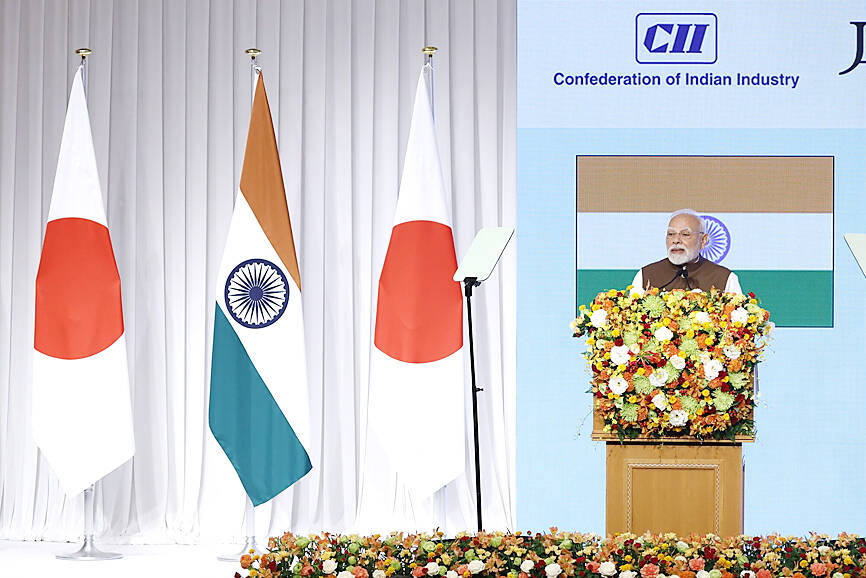Indian Prime Minister Narendra Modi arrived in Japan yesterday for a two-day summit where he was scheduled to meet with Japanese Prime Minister Shigeru Ishiba and secure investment pledges from Japan of more than ¥10 trillion (US$68 billion), people familiar with the matter said.
The trip takes on added weight in light of the US tariffs, as by deepening defense, technology and investment ties with Japan, India signals it can cushion the blow of lost US market access.
The two sides were also expected to sign an economic security pact covering cooperation on semiconductors, critical minerals and artificial intelligence, officials in New Delhi said, asking not to be identified to discuss matters that are still private.

Photo: Bloomberg
The two nations are partners “made for each other,” Modi said this week, after visiting a Suzuki plant in India.
The leaders are expected to discuss tie-ups on critical minerals and Japanese investments in high-value manufacturing in India, the officials said.
India is believed to hold substantial deposits of rare earths — used in everything from smartphones to solar panels — but lacks the technology to mine and process them extensively.
The two sides are also expected to step up plans on defense cooperation, with New Delhi focusing on transfer of technology and jointly developing military hardware, the people said.
India and Japan are working to develop a sophisticated sensor for seamless communication while increasing the stealth features of warships.

Indonesia was to sign an agreement to repatriate two British nationals, including a grandmother languishing on death row for drug-related crimes, an Indonesian government source said yesterday. “The practical arrangement will be signed today. The transfer will be done immediately after the technical side of the transfer is agreed,” the source said, identifying Lindsay Sandiford and 35-year-old Shahab Shahabadi as the people being transferred. Sandiford, a grandmother, was sentenced to death on the island of Bali in 2013 after she was convicted of trafficking drugs. Customs officers found cocaine worth an estimated US$2.14 million hidden in a false bottom in Sandiford’s suitcase when

CAUSE UNKNOWN: Weather and runway conditions were suitable for flight operations at the time of the accident, and no distress signal was sent, authorities said A cargo aircraft skidded off the runway into the sea at Hong Kong International Airport early yesterday, killing two ground crew in a patrol car, in one of the worst accidents in the airport’s 27-year history. The incident occurred at about 3:50am, when the plane is suspected to have lost control upon landing, veering off the runway and crashing through a fence, the Airport Authority Hong Kong said. The jet hit a security patrol car on the perimeter road outside the runway zone, which then fell into the water, it said in a statement. The four crew members on the plane, which

Japan’s ruling Liberal Democratic Party (LDP) and its junior partner yesterday signed a coalition deal, paving the way for Sanae Takaichi to become the nation’s first female prime minister. The 11th-hour agreement with the Japan Innovation Party (JIP) came just a day before the lower house was due to vote on Takaichi’s appointment as the fifth prime minister in as many years. If she wins, she will take office the same day. “I’m very much looking forward to working with you on efforts to make Japan’s economy stronger, and to reshape Japan as a country that can be responsible for future generations,”

SEVEN-MINUTE HEIST: The masked thieves stole nine pieces of 19th-century jewelry, including a crown, which they dropped and damaged as they made their escape The hunt was on yesterday for the band of thieves who stole eight priceless royal pieces of jewelry from the Louvre Museum in the heart of Paris in broad daylight. Officials said a team of 60 investigators was working on the theory that the raid was planned and executed by an organized crime group. The heist reignited a row over a lack of security in France’s museums, with French Minister of Justice yesterday admitting to security flaws in protecting the Louvre. “What is certain is that we have failed, since people were able to park a furniture hoist in the middle of